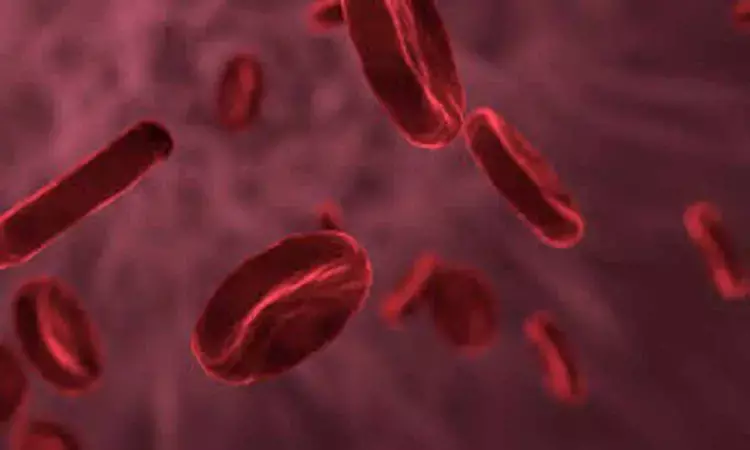- Home
- Medical news & Guidelines
- Anesthesiology
- Cardiology and CTVS
- Critical Care
- Dentistry
- Dermatology
- Diabetes and Endocrinology
- ENT
- Gastroenterology
- Medicine
- Nephrology
- Neurology
- Obstretics-Gynaecology
- Oncology
- Ophthalmology
- Orthopaedics
- Pediatrics-Neonatology
- Psychiatry
- Pulmonology
- Radiology
- Surgery
- Urology
- Laboratory Medicine
- Diet
- Nursing
- Paramedical
- Physiotherapy
- Health news
- Fact Check
- Bone Health Fact Check
- Brain Health Fact Check
- Cancer Related Fact Check
- Child Care Fact Check
- Dental and oral health fact check
- Diabetes and metabolic health fact check
- Diet and Nutrition Fact Check
- Eye and ENT Care Fact Check
- Fitness fact check
- Gut health fact check
- Heart health fact check
- Kidney health fact check
- Medical education fact check
- Men's health fact check
- Respiratory fact check
- Skin and hair care fact check
- Vaccine and Immunization fact check
- Women's health fact check
- AYUSH
- State News
- Andaman and Nicobar Islands
- Andhra Pradesh
- Arunachal Pradesh
- Assam
- Bihar
- Chandigarh
- Chattisgarh
- Dadra and Nagar Haveli
- Daman and Diu
- Delhi
- Goa
- Gujarat
- Haryana
- Himachal Pradesh
- Jammu & Kashmir
- Jharkhand
- Karnataka
- Kerala
- Ladakh
- Lakshadweep
- Madhya Pradesh
- Maharashtra
- Manipur
- Meghalaya
- Mizoram
- Nagaland
- Odisha
- Puducherry
- Punjab
- Rajasthan
- Sikkim
- Tamil Nadu
- Telangana
- Tripura
- Uttar Pradesh
- Uttrakhand
- West Bengal
- Medical Education
- Industry
Poloxamer 188 does not decrease vaso-occlusive episodes in sickle cell disease: JAMA

According to recent research, it has been found out that among patients with sickle cell disease, poloxamer 188 did not significantly shorten the duration of painful vaso-occlusive episodes.
The study is published in the JAMA Network.
A previous phase 3 trial of poloxamer 188 reported shortened duration of painful vaso-occlusive episodes in sickle cell disease, particularly in children and participants treated with hydroxyurea.
Although effective agents are available to prevent painful vaso-occlusive episodes of sickle cell disease (SCD), there are no disease-modifying therapies for ongoing painful vaso-occlusive episodes; treatment remains supportive.
Hence, James F. Casella and colleagues from the Johns Hopkins University School of Medicine, Baltimore, Maryland conducted the present study to reassess the efficacy of poloxamer 188 for vaso-occlusive episodes.
The researchers carried out a phase 3, randomized, double-blind, placebo-controlled, multicenter, international trial that included 66 hospitals in 12 countries and 60 cities; 388 individuals with SCD (hemoglobin SS, SC, S-β0 thalassemia, or S-β+ thalassemia disease) aged 4 to 65 years with acute moderate to severe pain typical of painful vaso-occlusive episodes requiring hospitalization were included.
A 1-hour 100-mg/kg loading dose of poloxamer 188 was administered intravenously followed by a 12-hour to 48-hour 30-mg/kg/h continuous infusion (n = 194) or placebo (n = 194). Time in hours from randomization to the last dose of parenteral opioids among all participants was evaluated and among those younger than 16 years as a separate subgroup was analyzed.
The results showed that-
- Of 437 participants assessed for eligibility, 388 were randomized (mean age, 15.2 years; 176 [45.4%] female), the primary outcome was available for 384 (99.0%), 15-day follow-up contacts were available for 357 (92.0%), and 30-day follow-up contacts were available for 368 (94.8%).
- There was no significant difference between the groups for the mean time to last dose of parenteral opioids (81.8 h for the poloxamer 188 group vs 77.8 h for the placebo group; difference, 4.0 h [95% CI, −7.8 to 15.7]; geometric mean ratio, 1.2 [95% CI, 1.0-1.5]; P = .09).
- Based on a significant interaction of age and treatment (P = .01), there was a treatment difference in time from randomization to last administration of parenteral opioids for participants younger than 16 years (88.7 h in the poloxamer 188 group vs 71.9 h in the placebo group; difference, 16.8 h [95% CI, 1.7-32.0]; geometric mean ratio, 1.4 [95% CI, 1.1-1.8]; P = .008).
- Adverse events that were more common in the poloxamer 188 group than the placebo group included hyperbilirubinemia (12.7% vs 5.2%); those more common in the placebo group included hypoxia (12.0% vs 5.3%).
Therefore, the authors concluded that "among children and adults with sickle cell disease, poloxamer 188 did not significantly shorten time to last dose of parenteral opioids during vaso-occlusive episodes. These findings do not support the use of poloxamer 188 for vaso-occlusive episodes."
Dr. Nandita Mohan is a practicing pediatric dentist with more than 5 years of clinical work experience. Along with this, she is equally interested in keeping herself up to date about the latest developments in the field of medicine and dentistry which is the driving force for her to be in association with Medical Dialogues. She also has her name attached with many publications; both national and international. She has pursued her BDS from Rajiv Gandhi University of Health Sciences, Bangalore and later went to enter her dream specialty (MDS) in the Department of Pedodontics and Preventive Dentistry from Pt. B.D. Sharma University of Health Sciences. Through all the years of experience, her core interest in learning something new has never stopped. She can be contacted at editorial@medicaldialogues.in. Contact no. 011-43720751
Dr Kamal Kant Kohli-MBBS, DTCD- a chest specialist with more than 30 years of practice and a flair for writing clinical articles, Dr Kamal Kant Kohli joined Medical Dialogues as a Chief Editor of Medical News. Besides writing articles, as an editor, he proofreads and verifies all the medical content published on Medical Dialogues including those coming from journals, studies,medical conferences,guidelines etc. Email: drkohli@medicaldialogues.in. Contact no. 011-43720751


